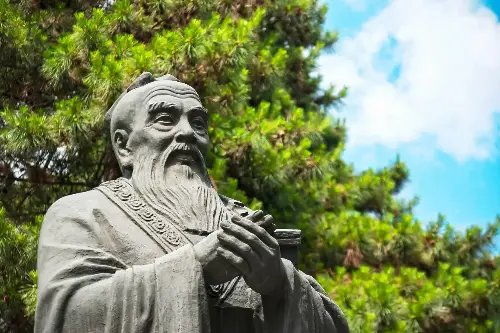An ancient philosophy born in the sixth century BC, Confucianism continues to permeate various aspects of life in numerous Eastern societies, and its influence stretches far beyond its geographical origin. The sage Confucius, or Kong Fuzi, provided a framework for morality, social order, and governmental responsibility that has remained relevant through the ages. This dive into Confucian wisdom will explore how the age-old teachings emphasise respect, relationships, and order, delivering lessons that still resonate in today's fast-paced world.
The Quintessence of Humaneness: Respect

Central to Confucian philosophy is the concept of 'Ren,' often translated as benevolence, humaneness, or simply, respect. This foundational element prescribes a life lived in consideration of others, promoting an ethical compass centred on empathy and compassion. Confucius posited that a society bound by respect for one another would be harmonious and just.
This respect extends to a reverence for ancestors and elders, stemming from the belief that wisdom and knowledge are cumulative, passed down through generations. The Confucian ideal encourages individuals to treat others with the dignity and honour they deserve, reflecting the highest degree of humaneness in their daily interactions.
The Interconnectedness of Personal Relationships
Confucianism places immense value on the role of relationships and the obligations and duties they incur. Five cardinal relationships are highlighted: ruler and subject, parent and child, husband and wife, elder sibling and younger sibling, and friend and friend. Each pair consists of a dominant and subordinate party, except for friends who are considered equals. These relationships, governed by the principle of 'Li,' advocate a harmonious social order where every person knows their role and responsibilities towards one another.
Furthermore, the concept of 'Xiao,' meaning filial piety, underscores the expectation of respect towards one's parents and elders. It extends to the devotion one shows to family and the prioritisation of family interests. The overlapping realms of familial duty expand outwards to the societal level, positing that a strong state relies upon the strength of its family units.
The Blueprint for Social Order and Righteous Governance

The administrative blueprint Confucius laid out pivots on the notion that a ruler should lead by moral example, embodying the virtues expected of all. The concept of 'De,' often interpreted as virtue, reinforces the idea that moral authority is more influential and enduring than the power wielded through fear or coercion.
Just as individuals are taught to cultivate personal virtues, rulers should focus on righteousness and moral integrity. In turn, their subjects would align themselves with these values. Confucius held that social harmony was achievable when leaders were virtuous and subjects were respectful and committed to fulfilling their societal roles.
Education as a Pillar of Personal and Social Development
Confucius was a staunch advocate for education, believing it to be the means through which individuals could cultivate moral virtues and wisdom. Unlike the elitist educational systems of his time, Confucius insisted that learning should be accessible to all, regardless of social standing. For him, the pursuit of knowledge and self-improvement was a lifelong endeavour, one that enhanced both personal virtue and societal prosperity.
With education comes the ability to discern, to foster the moral development required to sustain the harmonious social fabric that Confucianism envisages. The teachings hold that an educated populace is better equipped to understand and fulfil their roles within the family and the state, leading to a more coherent and stable society.
The Relevance of Confucian Principles in Modern Times

In the modern context, the Confucian emphasis on respect, hierarchical relationships, and social order may seem incongruent with Western individualism and democracy. Yet, these principles offer insightful perspectives on global issues like corporate governance, societal development, and even environmental stewardship. The focus on community, family values, and ethical governance resonates with the universal pursuit of balance in our lives.
Understanding Confucian wisdom allows us to grasp the foundational values that guide billions of people in their daily lives, informing political structures, social interactions, and personal philosophies. Across East and West, the enduring legacy of Confucius teaches that a society rooted in respect, interconnected relationships, and genuine leadership is one that can thrive in harmony and order.
As we navigate the complexities of the 21st century, the ancient yet timeless wisdom of Confucius can still guide us towards a collective ethos of empathy and discipline. By delving into these philosophical tenets, we can appreciate the layers of meaning behind the seeming simplicity of Confucian teachings and perhaps apply them to foster a world of greater respect and understanding.
